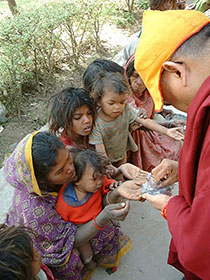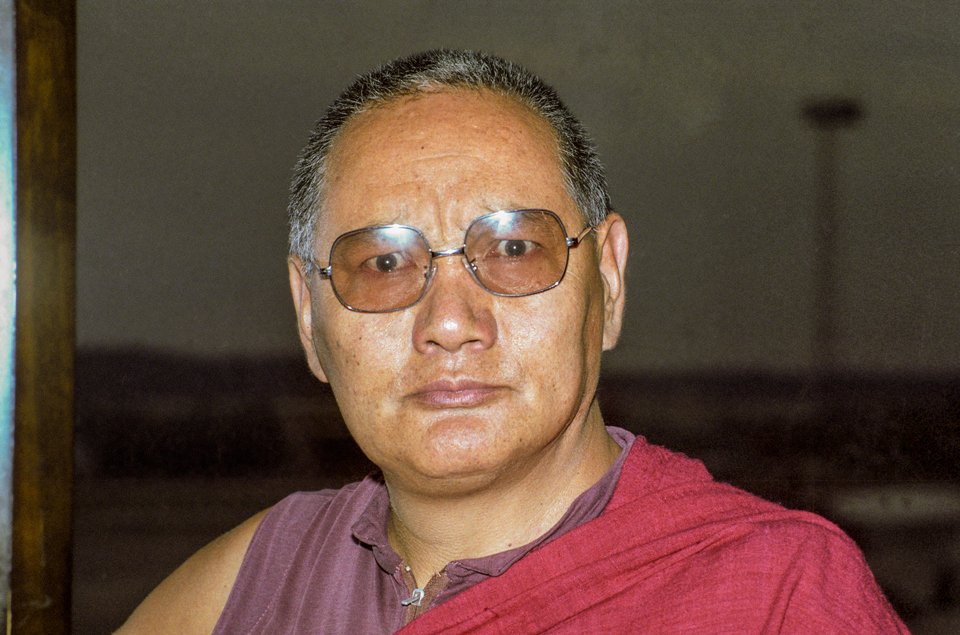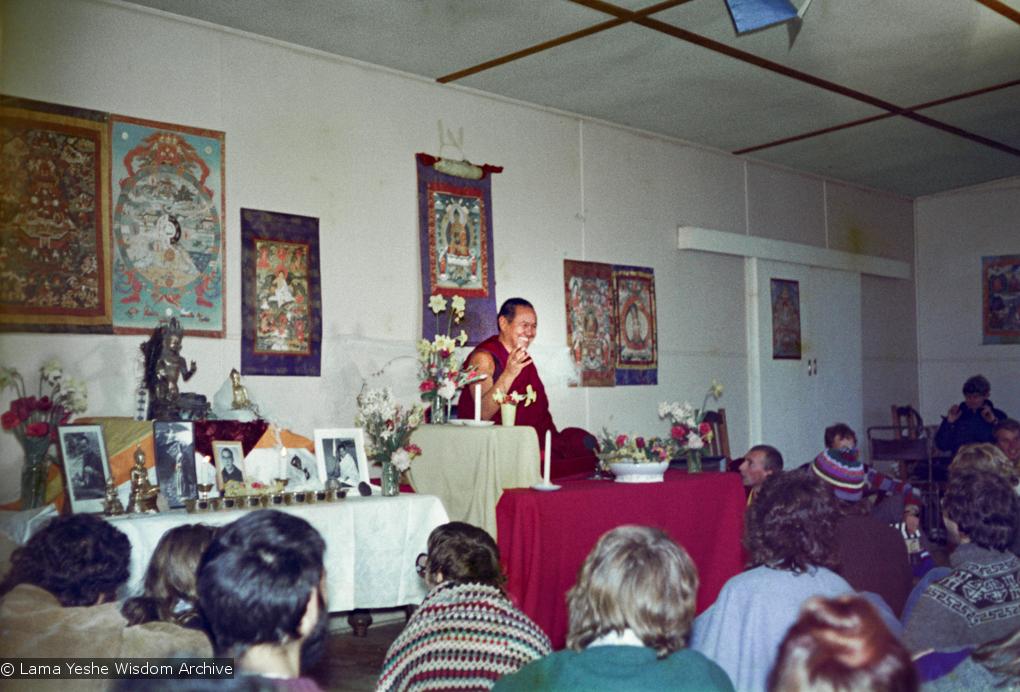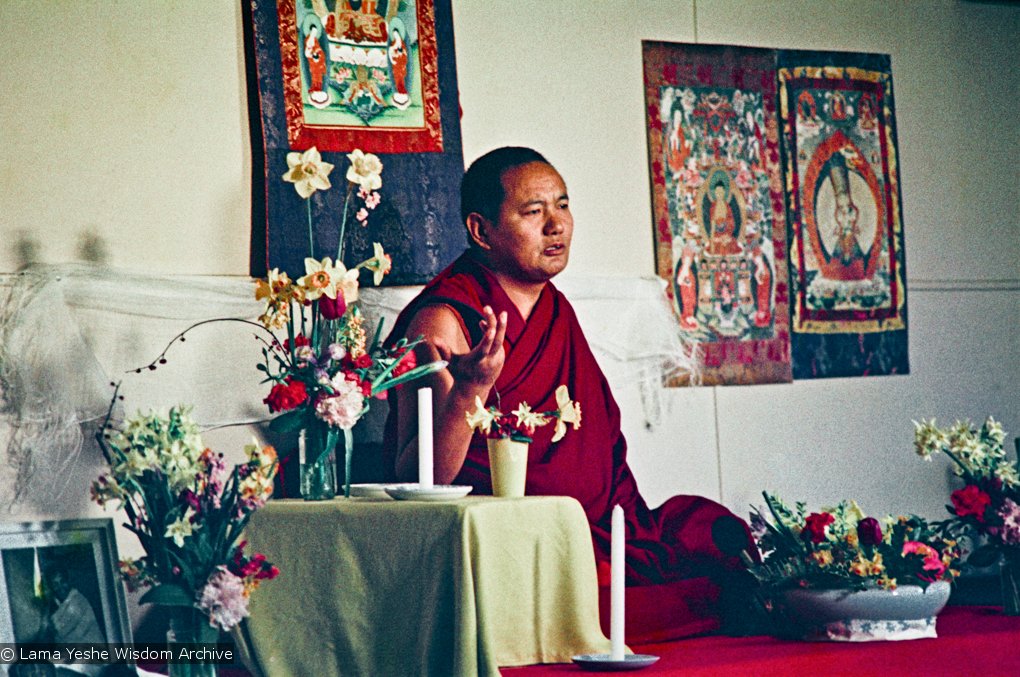- Home
- FPMT Homepage
Foundation for the Preservation of the Mahayana Tradition
The FPMT is an organization devoted to preserving and spreading Mahayana Buddhism worldwide by creating opportunities to listen, reflect, meditate, practice and actualize the unmistaken teachings of the Buddha and based on that experience spreading the Dharma to sentient beings. We provide integrated education through which people’s minds and hearts can be transformed into their highest potential for the benefit of others, inspired by an attitude of universal responsibility and service. We are committed to creating harmonious environments and helping all beings develop their full potential of infinite wisdom and compassion. Our organization is based on the Buddhist tradition of Lama Tsongkhapa of Tibet as taught to us by our founders Lama Thubten Yeshe and Lama Thubten Zopa Rinpoche.
- Willkommen
Die Stiftung zur Erhaltung der Mahayana Tradition (FPMT) ist eine Organisation, die sich weltweit für die Erhaltung und Verbreitung des Mahayana-Buddhismus einsetzt, indem sie Möglichkeiten schafft, den makellosen Lehren des Buddha zuzuhören, über sie zur reflektieren und zu meditieren und auf der Grundlage dieser Erfahrung das Dharma unter den Lebewesen zu verbreiten.
Wir bieten integrierte Schulungswege an, durch denen der Geist und das Herz der Menschen in ihr höchstes Potential verwandelt werden zum Wohl der anderen – inspiriert durch eine Haltung der universellen Verantwortung und dem Wunsch zu dienen. Wir haben uns verpflichtet, harmonische Umgebungen zu schaffen und allen Wesen zu helfen, ihr volles Potenzial unendlicher Weisheit und grenzenlosen Mitgefühls zu verwirklichen.
Unsere Organisation basiert auf der buddhistischen Tradition von Lama Tsongkhapa von Tibet, so wie sie uns von unseren Gründern Lama Thubten Yeshe und Lama Thubten Zopa Rinpoche gelehrt wird.
- Bienvenidos
La Fundación para la preservación de la tradición Mahayana (FPMT) es una organización que se dedica a preservar y difundir el budismo Mahayana en todo el mundo, creando oportunidades para escuchar, reflexionar, meditar, practicar y actualizar las enseñanzas inconfundibles de Buda y en base a esa experiencia difundir el Dharma a los seres.
Proporcionamos una educación integrada a través de la cual las mentes y los corazones de las personas se pueden transformar en su mayor potencial para el beneficio de los demás, inspirados por una actitud de responsabilidad y servicio universales. Estamos comprometidos a crear ambientes armoniosos y ayudar a todos los seres a desarrollar todo su potencial de infinita sabiduría y compasión.
Nuestra organización se basa en la tradición budista de Lama Tsongkhapa del Tíbet como nos lo enseñaron nuestros fundadores Lama Thubten Yeshe y Lama Zopa Rinpoche.
A continuación puede ver una lista de los centros y sus páginas web en su lengua preferida.
- Bienvenue
L’organisation de la FPMT a pour vocation la préservation et la diffusion du bouddhisme du mahayana dans le monde entier. Elle offre l’opportunité d’écouter, de réfléchir, de méditer, de pratiquer et de réaliser les enseignements excellents du Bouddha, pour ensuite transmettre le Dharma à tous les êtres. Nous proposons une formation intégrée grâce à laquelle le cœur et l’esprit de chacun peuvent accomplir leur potentiel le plus élevé pour le bien d’autrui, inspirés par le sens du service et une responsabilité universelle. Nous nous engageons à créer un environnement harmonieux et à aider tous les êtres à épanouir leur potentiel illimité de compassion et de sagesse. Notre organisation s’appuie sur la tradition guéloukpa de Lama Tsongkhapa du Tibet, telle qu’elle a été enseignée par nos fondateurs Lama Thoubtèn Yéshé et Lama Zopa Rinpoché.
Visitez le site de notre Editions Mahayana pour les traductions, conseils et nouvelles du Bureau international en français.
Voici une liste de centres et de leurs sites dans votre langue préférée
- Benvenuto
L’FPMT è un organizzazione il cui scopo è preservare e diffondere il Buddhismo Mahayana nel mondo, creando occasioni di ascolto, riflessione, meditazione e pratica dei perfetti insegnamenti del Buddha, al fine di attualizzare e diffondere il Dharma fra tutti gli esseri senzienti.
Offriamo un’educazione integrata, che può trasformare la mente e i cuori delle persone nel loro massimo potenziale, per il beneficio di tutti gli esseri, ispirati da un’attitudine di responsabilità universale e di servizio.
Il nostro obiettivo è quello di creare contesti armoniosi e aiutare tutti gli esseri a sviluppare in modo completo le proprie potenzialità di infinita saggezza e compassione.
La nostra organizzazione si basa sulla tradizione buddhista di Lama Tsongkhapa del Tibet, così come ci è stata insegnata dai nostri fondatori Lama Thubten Yeshe e Lama Zopa Rinpoche.
Di seguito potete trovare un elenco dei centri e dei loro siti nella lingua da voi prescelta.
- 欢迎 / 歡迎
简体中文
“护持大乘法脉基金会”( 英文简称:FPMT。全名:Foundation for the Preservation of the Mahayana Tradition) 是一个致力于护持和弘扬大乘佛法的国际佛教组织。我们提供听闻,思维,禅修,修行和实证佛陀无误教法的机会,以便让一切众生都能够享受佛法的指引和滋润。
我们全力创造和谐融洽的环境, 为人们提供解行并重的完整佛法教育,以便启发内在的环宇悲心及责任心,并开发内心所蕴藏的巨大潜能 — 无限的智慧与悲心 — 以便利益和服务一切有情。
FPMT的创办人是图腾耶喜喇嘛和喇嘛梭巴仁波切。我们所修习的是由两位上师所教导的,西藏喀巴大师的佛法传承。
繁體中文
護持大乘法脈基金會”( 英文簡稱:FPMT。全名:Found
ation for the Preservation of the Mahayana Tradition ) 是一個致力於護持和弘揚大乘佛法的國際佛教組織。我們提供聽聞, 思維,禪修,修行和實證佛陀無誤教法的機會,以便讓一切眾生都能 夠享受佛法的指引和滋潤。 我們全力創造和諧融洽的環境,
為人們提供解行並重的完整佛法教育,以便啟發內在的環宇悲心及責 任心,並開發內心所蘊藏的巨大潛能 — 無限的智慧與悲心 – – 以便利益和服務一切有情。 FPMT的創辦人是圖騰耶喜喇嘛和喇嘛梭巴仁波切。
我們所修習的是由兩位上師所教導的,西藏喀巴大師的佛法傳承。 察看道场信息:
- FPMT Homepage
- News/Media
-
- Study & Practice
-
-
- About FPMT Education Services
- Latest News
- Programs
- New to Buddhism?
- Buddhist Mind Science: Activating Your Potential
- Heart Advice for Death and Dying
- Discovering Buddhism
- Living in the Path
- Exploring Buddhism
- FPMT Basic Program
- FPMT Masters Program
- FPMT In-Depth Meditation Training
- Maitripa College
- Lotsawa Rinchen Zangpo Translator Program
- Universal Education for Compassion & Wisdom
- Online Learning Center
-
- Prayers & Practice Materials
- Overview of Prayers & Practices
- Full Catalogue of Prayers & Practice Materials
- Explore Popular Topics
- Benefiting Animals
- Chenrezig Resources
- Death & Dying Resources
- Lama Chopa (Guru Puja)
- Lama Zopa Rinpoche: Compendium of Precious Instructions
- Lama Zopa Rinpoche: Life Practice Advice
- Lama Zopa Rinpoche Practice Series
- Lamrim Resources
- Mantras
- Prayer Book Updates
- Purification Practices
- Sutras
- Thought Transformation (Lojong)
- Audio Materials
- Dharma Dates - Tibetan Calendar
- Translation Services
- Publishing Services
- Ways to Offer Support
- Prayers & Practice Materials
-
- Teachings and Advice
- Find Teachings and Advice
- Lama Zopa Rinpoche Advice Page
- Lama Zopa Rinpoche: Compendium of Precious Instructions
- Lama Zopa Rinpoche Video Teachings
- ༧སྐྱབས་རྗེ་བཟོད་པ་རིན་པོ་ཆེ་མཆོག་ནས་སྩལ་བའི་བཀའ་སློབ་བརྙན་འཕྲིན།
- Podcasts
- Lama Yeshe Wisdom Archive
- Buddhism FAQ
- Dharma for Young People
- Resources on Holy Objects
- Teachings and Advice
-
-
*If a menu item has a submenu clicking once will expand the menu clicking twice will open the page.
-
-
- Centers
-
- Teachers
-
- Projects
-
-
-
-
*If a menu item has a submenu clicking once will expand the menu clicking twice will open the page.
-
-
- FPMT
-
-
-
-
-
May there be no war, disease or natural disaster such as fire, flood, earthquake and so forth. May everybody realize bodhichitta, the good heart, enjoy peace and happiness and as quickly as possible realize the wisdom directly perceiving emptiness, cease all their defilements and achieve enlightenment.
Lama Zopa Rinpoche
-
-
-
- Shop
-
-
-
The Foundation Store is FPMT’s online shop and features a vast selection of Buddhist study and practice materials written or recommended by our lineage gurus. These items include homestudy programs, prayers and practices in PDF or eBook format, materials for children, and other resources to support practitioners.
Items displayed in the shop are made available for Dharma practice and educational purposes, and never for the purpose of profiting from their sale. Please read FPMT Foundation Store Policy Regarding Dharma Items for more information.
-
-
Lama Yeshe’s Wisdom
16
Lama Yeshe on the Experience of Death
Lama Thubten Yeshe, who founded the FPMT organization with Lama Zopa Rinpoche, is remembered for his ability to communicate the essence of Buddhist teachings in a way that connected with Western students. In September 1983, Lama Yeshe gave a public talk in Stockholm, Sweden, where he discussed why we should not be afraid of death. In the following excerpt from the talk, Lama Yeshe explains what happens at the time of death.
First, we should not be afraid of death because from the moment we were born we’ve been destined to die. There’s no way out. Sometimes people get angry when they’re asked how old they are: “That’s none of your business!” But even though getting old is natural, it often makes Western people upset.
Dying, too, is natural and, as we know, it can be a gradual experience. It can also be a blissful experience, although most people regard it as something fearsome. That’s a wrong attitude. Our body is composed of the four elements of earth, water, fire, and air, and in the course of a natural death, these four elements gradually disintegrate. We also have five skandhas, or aggregates—form, feeling, discrimination, compositional factors, and consciousness. At the time of death, these too sequentially deteriorate, or lose power.
What first happens when we die is that the form skandha, the essence of our body, begins to disintegrate and we feel as if we are being buried under a great pile of dirt. The concomitant dissolution of our earth element causes us great confusion, as do the forthcoming dissolutions of the other skandhas and elements.
Therefore, it is very important to educate people and ourselves as to what happens during the death process so that we know what’s coming and can understand that it’s just a mental projection. In that way, we can die without fear and confusion. In this first cycle our eye sense also dissolves and our eyesight becomes unclear. The internal sign is a mirage-like vision.
Next, the skandha of feeling disintegrates, and we lose all sense of pain and pleasure. We also lose our hearing. Our body becomes just like a dead banana! Along with this our water element dissolves. The internal sign is an appearance of smoke.
Third, our fire element and skandha of discrimination disintegrate, and we can no longer remember the names of our mother, father, husband, wife, children, or other family and friends. We also lose our sense of smell. Our inhalation becomes weak and our exhalation lengthy. The internal sign is that of sparks of fire. These internal signs are not observed by our eye sense consciousness but are mental projections, manifestations of our more subtle consciousness and akin to dreaming.
So you can see, during the death process, as in life actually, nobody is creating problems for you other than yourself. All your anxiety, emotional hatred, desire, and so forth come from within yourself. At this time, however, your delusions naturally slow down and gradually disappear.
In the fourth cycle our air element deteriorates, and our breathing stops altogether. At this point all our ego problems naturally disappear. This is not as a result of practice; it’s just natural. It is here that meditators take the opportunity of meditating on the fundamental nature of universal reality. By contemplating on it more and more they can begin to gain direct experiences of it.
I want to make one thing very clear here because Western preconceptions are very strong regarding this—from the Buddhist point of view, even though external breathing seems to have stopped and it would appear to be the moment of clinical death, a subtle breath remains inside. The person is not yet completely dead. This explanation conflicts with baby Western science. Western science is very young, and its opinion on this is very dangerous because, at this stage of the death process, the person is still alive and can survive for a long time in the subtle body with subtle breathing, which is not observable from the outside.
As you know, India is a very hot place and refrigerators for corpses are few and far between. So they tend to burn bodies within hours of what they consider to be death. I heard that once someone was being burned and when his body was half burned he sat up and cried, “Please don’t burn me, I’m not dead!” This is human experience. I’m not talking religion here. Don’t think that this is some Buddhist projection. Ordinary people saw this.
Similarly, I heard of a case in France where a nonreligious man was declared dead by doctors but awoke after a couple of hours. He wrote a quite well known book describing his experience of being dead for two hours. Again, this is human experience, not something influenced by Buddhist or religious philosophy.
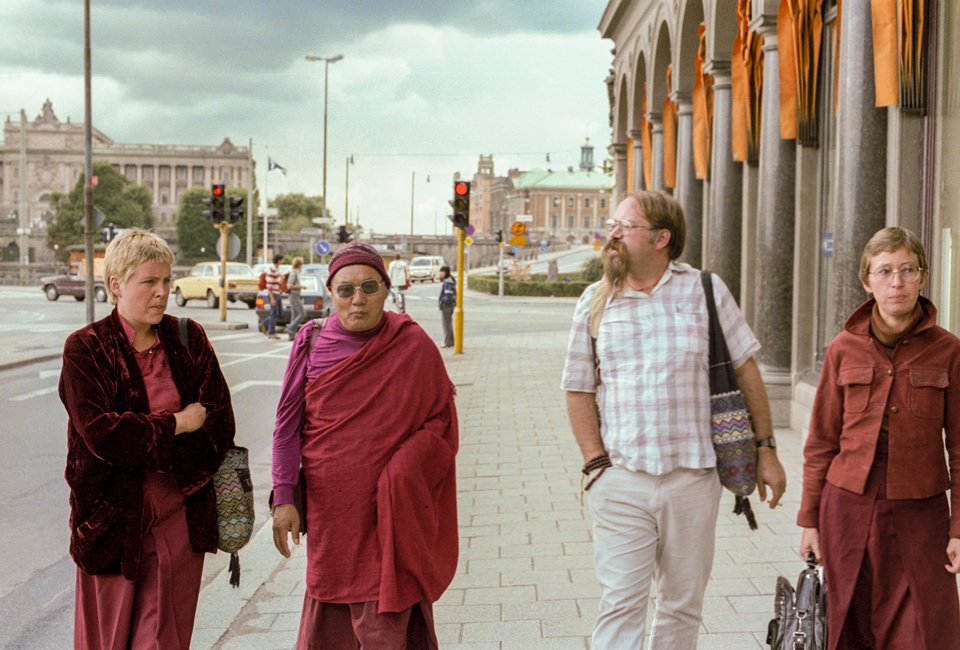
Lama Yeshe with (from left) Ven. Gun Johansson, Jeff Nye, and Ven. Karin Valham, Stockholm, Sweden, September 1983
Completing the Death Process
After our breathing stops we experience three visions. The first of these is the white vision. This has nothing to do with our physical eye sense, which is already a dead banana. It’s an inner, mental experience. Because all our crowded, intellectual, ego-grasping superstitions have stopped, we suddenly reach a point of infinite space, or sky. The impression in our mind is of a calm, clear blue sky, a clear mental experience of completely infinite blue space that appears to our subtle consciousness as a white light vision.
From that experience our mind again moves to infinite blue sky in which there now appears a red light vibration. Then that suddenly stops and everything goes black. Finally, this black vision slowly clears and we again experience infinite universal space and a fourth vision, that of clean clear light. In this there are no concepts, no value judgments, no classifications, and no division of anything into good and bad.
Some meditators can remain in the clear light meditation for many days. Even if you are not a meditator, you stay there a little while. Even if you don’t believe you’re in a clean clear state, you stay in the clear light state of consciousness anyway. Sometimes we refer to it as the dharmakaya experience. Actually there’s a bit of a debate about this. Some meditators say that everybody experiences universal reality. Others say that it’s not exactly that but similar.
The Intermediate State
When the clear light vision stops, our consciousness finally separates from our body and passes into the intermediate state, the bardo. Because the clear light was so bright, when it stops, passage into the bardo is experienced as darkness. Then we’re in the bardo for a while and when it’s time to go into the next life, we go through the three visions in reverse: the dark vision, the red vision, and the white vision. After that, in our next life, all our worldly superstitions and ego problems arise once more.
What is a bardo being? The bardo body is not material like ours. It’s a sort of conscious body. It’s very light and can pass through mountains and other solid things. Its only enjoyment is smell. It has no desire to eat chocolate. But it is full of confusion and superstition and is constantly seeking to come into the desire realm, grasping to enter a mother’s womb.
A bardo being fortunate enough to be reborn human sees its future parents engaged in intercourse and its consciousness enters the father’s central channel, passes down through it and enters the products of conception in the mother’s womb. After that its development is exactly the same as contemporary science explains. Therefore, Western parents should not expect their children’s minds to be the same as their complicated minds. The new generation also has its own generation gap, its own evolution, and its own ignorant understandings. From the Buddhist point of view, every human being is completely different until we reach beyond the dualistic mind. Then everybody’s mind is at the same level.
What I’ve been describing here is the evolution of a natural human death. This is Buddhism’s scientific explanation of what happens to the human body and mind at death.
Excerpted from “We Should Not Be Afraid of Death,” published in Mandala July–December 2015, which is taken from a public lecture given by Lama Yeshe at the Ethnographic Museum, Stockholm, Sweden, September 8, 1983. It was edited from the Lama Yeshe Wisdom Archive by Nicholas Ribush.
Find more advice and resources on death and dying at FPMT.org/death.
Through timely advice, news stories, and updates, FPMT.org and Mandala Publications share the wisdom culture inspired and guided by the teachings of FPMT founders Lama Thubten Yeshe and Lama Thubten Zopa Rinpoche.
- Tagged: advice for death and dying, advice from lama yeshe, death, death and dying, impermanence and death, lama yeshes wisdom
24
You Cannot Say All Desire Is Negative
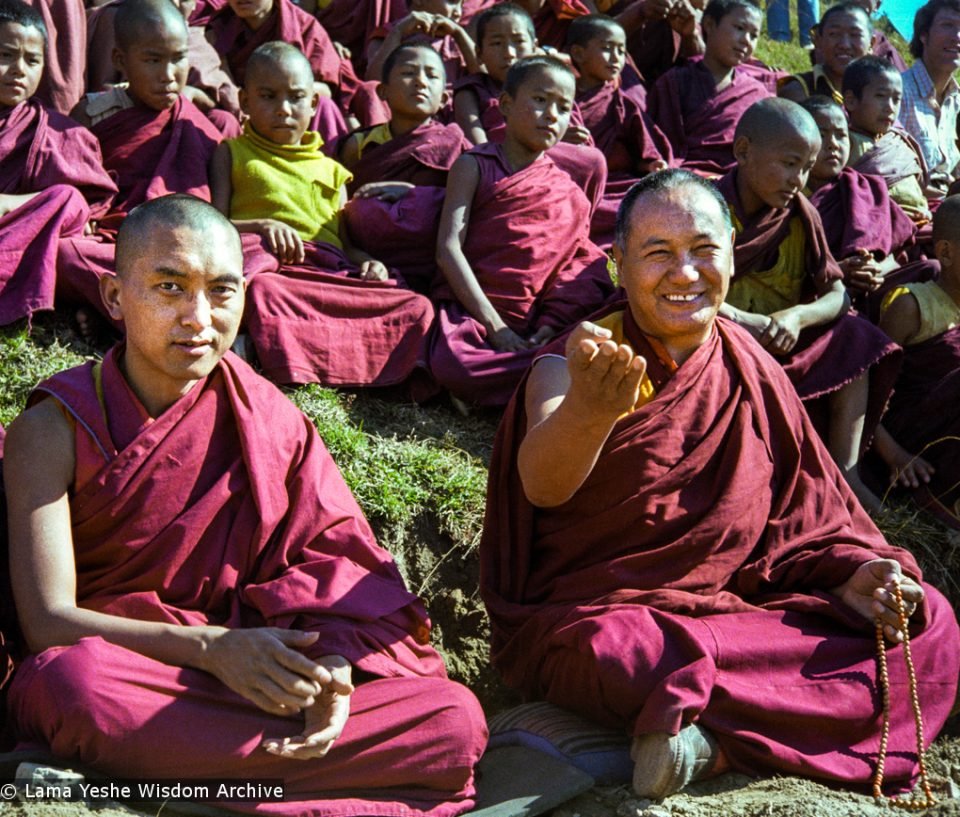
Lama Zopa Rinpoche and Lama Yeshe at the twelfth Meditation Course, Kopan Monastery, Nepal, 1979. Photo by Ina Van Delden, courtesy of Lama Yeshe Wisdom Archive.
Lama Thubten Yeshe, who founded the FPMT organization with Lama Zopa Rinpoche, excelled at helping Western students connect with the essence of the Buddha’s teachings. He encouraged students to use their judgement and showed them how to be serious, yet balanced Dharma practitioners. Here Lama Yeshe offers advice on how to view attachment.
There are teachings in the lamrim that say we should be grateful for the eight worldly dharmas. Why is that? First of all, how can we gain liberation from samsara without transcending the eight worldly dharmas? Even Shakyamuni Buddha himself went through them on his way to enlightenment. It’s part of our spiritual evolution. At some point, having gone through the eight worldly dharmas, we reach beyond them, attaining liberation or even enlightenment.
In his lamrim teachings, Lama Tsongkhapa very clearly describes three types of eight worldly dharmas: black, mixed, and white. When we engage in worldly activity, one aspect of our action might be good, but as we’re doing it a negative thought can arise so that the result will be sort of mixed. So philosophically, and this is also in the lamrim, you can’t say that all attachment is negative. Westerners can be oversensitive. They see in the lamrim that attachment is our biggest problem and conclude that it must be completely negative. Lama Tsongkhapa says, “No!”
Logically we can see that, from the Buddhist point of view, all human life, including our body, comes from the positive mind. It’s positive karma that produces this body that gives us the ability to enjoy things. But, as human beings, we have limitations. When the lamrim teachings highlight certain aspects of our life as negative, we can jump to the conclusion that everything to do with attachment is negative: “I am completely negative; the world is completely negative.” Then everything gets very dark, because that’s the exaggerated way in which we project or interpret it.
I want you to understand clean clear that we distinguish two things: negative, or sinful, and positive. Attachment, or desire, can be negative and sinful, but it can also be positive. The positive aspect is that which produces pleasure: samsaric pleasure, human pleasure—the ability to enjoy the world, to see it as beautiful, to have whatever you find attractive.
So you cannot say that all desire is negative and produces only pain. Wrong. You should not think like that. Desire can produce pleasure—but only temporary pleasure. That’s the distinction. It’s temporary pleasure. And we don’t say that temporal pleasure is always bad, that you should reject it. If you reject temporal pleasure, then what’s left? You haven’t attained eternal happiness yet, so all that’s left is misery.
But you should not make the mistake of trying to actualize temporary pleasure [as an end in itself]. You can enjoy it while you have it, but you should not squeeze yourself striving for it. The problem is the mind that believes temporary pleasure to be the best there is. That’s a total delusion, an over-estimated conception. Like looking at a cloud in the sky and thinking, “What a beautiful cloud; I wish it would last forever.” You’re dreaming.
We should recognize all our human pleasures as similarly impermanent. They come; they go. They’re limited, and we should expect them to be limited. That’s their nature. Our expectations should always be in accord with the way things are. Therefore, we should not grasp at temporary pleasure as if it were eternal, everlasting happiness. That’s deluded, a fantasy.
Of course, the lamrim and Mahayana Buddhism in general talk about attachment and self-cherishing as incredibly big problems. And when you hear that, you might think, “I want to give them up today!” You can’t. It’s impossible; you’re too ambitious. You need to understand that attachment is a problem in everyday life because you have too many fixed ideas and unreasonable expectations. You can’t give all that up overnight. Work it out slowly: “I’m grateful to understand how attachment works, but it will take time to overcome it. There are certain things I can handle now, but I can’t manage everything at once.”
Remember what I said about the mixed eight worldly dharmas—actions that are a little bit white and a little bit black so that the results are mixed too; not totally negative. So you have to see where you fall in this and use your own judgment when deciding how to deal with your own attachment. Just don’t look at all attachment as completely negative. It’s not. There are degrees of attachment.
You’ve probably heard about the five paths and the ten bodhisattva levels (bhumis). For example, there are the paths of merit, preparation and seeing, at which point one attains the first bhumi. It’s quite a long journey. From there up to the eighth bhumi, you can still have some attachment. As I said, it has degrees.
Knowing this, we beginners should be encouraged that it is only when we reach the incredibly high eighth bodhisattva bhumi that we are completely free of attachment. Starting from where we are, we first deal with its gross levels and slowly, slowly rid ourselves of it.
So don’t be too idealistic: “How fantastic. Lama has told me all about attachment”; and then go home and tell your father, “Your problem is attachment”; your boyfriend, “Your problem is attachment.” Everything is attachment. Then people start telling you, “You know what? Your problem is attachment.”
Well, philosophically, we might understand attachment clean clear, but in practice we have to be reasonable and, as the lamrim explains, have a realistic attitude towards attachment. So, if you see some benefit for yourself or others in doing something, even small, although it might be tinged by attachment, do it. Do what you can; that’s good enough.
When some Westerners first encounter the lamrim teachings they get the impression that it’s all about suffering: “Buddhism says I’ve been suffering since forever! I should be suffering!” Since they’ve been brought up to believe that in fact they should not suffer and should always enjoy pleasure, they really don’t like this Eastern way of thinking and can’t reconcile the two. Have you felt like that? Anyway, it’s not true. Buddhism wants you and all other sentient beings to discover everlasting happiness and bliss; eternal peace. That’s the enlightenment experience; that’s the goal of the lamrim teachings. Don’t think that small worldly pleasures are the only happiness there is; that if you just have this thing or that, you’ll be happy. That’s small, narrow-minded thinking. And that’s the problem.
Worldly happiness is OK, but judge it reasonably. Enjoy it without grasping at it as real, which only results in more pain. That’s all that Buddhism is talking about. You should have pleasure and not feel guilty when you do. What do I mean by pleasure? It’s a feeling that satisfies you for a moment and doesn’t disturb your mind. You get a little pleasure—that’s good enough. Accept it for what it is and don’t feel guilty. Be as happy as possible. If you’re irritated, how can you be peaceful within yourself or give happiness to those around you?
If I’m crying my eyes out and at the same time saying, “I want to give you happiness, I want to give you happiness,” you’re not going to know how to handle me. “He wants to give me happiness but he’s crying.” Soon you’re going to start crying too. All we do is make each other cry.
Therefore, if you’re experiencing pleasure, be reasonable; remain calm and clear, even if you notice that your grasping mind is there beneath it all. And if you have a feeling of loving kindness towards another, enjoy that too. Don’t feel guilty.
Lama Yeshe gave this teaching during the twelfth Kopan meditation course, November 1979. Edited from the Lama Yeshe Wisdom Archive (www.lamayeshe.com) by Nicholas Ribush. Published as “You Cannot Say All Desire Is Negative” in Mandala January-March 2014.
For more on the eight worldly dharmas, see Lama Zopa Rinpoche’s How to Practice Dharma: Teachings on the Eight Worldly Dharmas.
Through timely advice, news stories, and updates, FPMT.org and Mandala Publications share the wisdom culture inspired and guided by the teachings of FPMT founders Lama Thubten Yeshe and Lama Thubten Zopa Rinpoche.
1
Taking Suffering and Giving Happiness
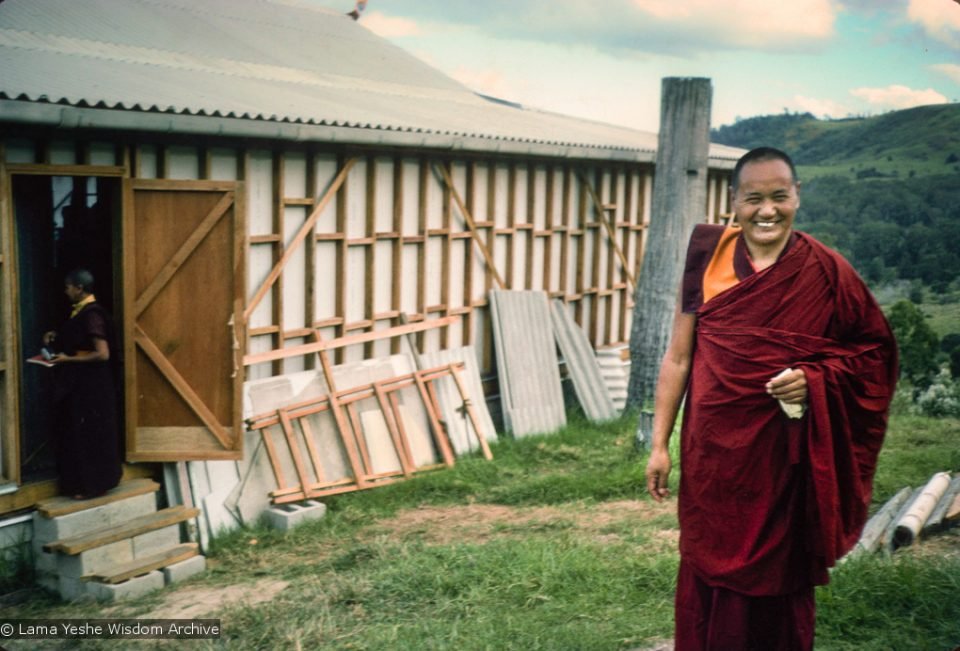
Lama Yeshe during the month-long course at Chenrezig Institute, Australia, 1975. Photo courtesy of Lama Yeshe Wisdom Archive.
Lama Thubten Yeshe, who founded the FPMT organization with Lama Zopa Rinpoche, had a way of clearly relating Dharma practice to the everyday experiences of the Western students he taught. Here Lama Yeshe offers advice on how to understand attachment and transform it into compassionate concern for others.
We are most fortunate to have been able to pinpoint attachment as the greatest of all problems. When we speak of evil, demons, and so forth, it’s the inner devil of attachment we’re talking about. Even though for countless lives we’ve looked outside ourselves for the source of our problems, there’s nothing external to blame. Therefore we should rejoice that we have finally identified this inner cause of all suffering.
We can be quite foolish. Say you’re in a spooky old house somewhere with a couple of friends. It’s late at night, and you’re watching horror movies on TV. One of your friends says, “Don’t go into the basement; there’s something evil down there.” Then, if you do have to go down to the basement, you feel scared: “There really is something evil down here.” You’re so easily prone to superstition. This is completely silly. There’s no such thing as external evil and fear of it is simply a projection of the evil in your own mind. If you speculate enough, your superstitious mind is sure to produce something, and where once you were unafraid, you now feel fear. All such foolishness comes from attachment.
Therefore finally recognizing that all these negative things—demons, enemies, evil, or whatever other terms are used in everyday conversation, science, or religion—come from the inner demon of attachment and bravely changing attachment to oneself into concern for others is both wonderful and wise.
There are countless living beings on Earth but very few know about exchanging self and others. This practice may be very difficult but it’s extremely worthwhile. If you can do it, it will help solve all your problems.
Changing your outlook in this way transforms whatever misery you perceive into the peaceful path of liberation.
We desperately need a method such as this. Life is suffering; our minds are weak. Exchanging self and others is truly revolutionary and this inner revolution, which has nothing to do with radical external change, completely turns our mental attitude upside down.
If you were to think that Buddhism was simply about sitting in meditation practicing concentration, you might reject it: “My knees hurt; my body wasn’t built for this. Buddhism is just a Himalayan lama thing. Anyway, I can’t live without working and taking care of my worldly affairs. Dharma is not for me.” But Mahayana Buddhism is about much more than just sitting in concentration. If you are wise, you can practice twenty-four hours a day.
Whenever any difficulty or problem arises, instead of getting depressed, be brave. Think, “Fantastic. If this problem had not arisen I might have felt I had no problems. This problem is my teacher; all problems are my teacher. They give me knowledge-wisdom and help me recognize more clearly the nature of attachment. This is so wonderful. May all mother sentient beings’ problems ripen upon me right now and may they receive all my merit, fortune, and wisdom.”
If you have difficulty taking the suffering of others onto yourself, first practice on yourself. The next time your knees hurt when you’re sitting in meditation, take that pain onto your ego and let it freak out. Let your ego freak out more and more. Practice that for a week.
Then practice taking onto yourself all the suffering you have ever experienced in your life. Your ego and attachment won’t like that either, but let them freak out again. Then slowly, slowly extend your practice to take upon yourself the sufferings of your parents, your friends, all the people in your country, and all the people on Earth until you are receiving the problems and suffering of all sentient beings throughout the universe. Then, without hesitation, send out to them all your possessions, happiness, and merit.
What is the technique for actually practicing this taking and giving meditation, which Tibetans call tonglen? You combine it with meditation on the breath in what is basically a nine-round breathing meditation.
Start by breathing out through your right nostril. Visualize the air you exhale in the form of white light, the essence of which is all your positive energy and wisdom. This white light radiates to all sentient beings in the six realms of samsara and beyond. It enters their left nostril, goes into their hearts and generates in them great bliss. Visualize the air they exhale in the form of thick black smoke, the essence of which is all their negativity, confusion, and heavy suffering. This dark, polluted energy enters your left nostril and goes down into your heart. Don’t leave it outside of you; bring it right down into your heart so that your ego and attachment completely freak out.
The nature of attachment is such that when problems arise, it blindly pushes them away. This practice trains your mind to handle negativity, feel compassion for the others, and take their suffering and problems onto yourself, which in turn helps you overcome self-cherishing and cherish others more than yourself.
Do the above cycle of breathing white light out through your right nostril and black smoke in through your left three times. Then breathe out through your left nostril and in through your right three times. Then breathe out and in through both nostrils together three times. At the end of each nine rounds concentrate for as long as you can that you and all other sentient beings have been completely purified of all suffering, negativity, and dualistic mind, and are fully enlightened, experiencing everlasting bliss that pervades your entire body and mind. When you lose focus on this, repeat the nine rounds once more. Repeat this cycle again and again for the duration of the session.
Don’t think that this is just a fantasy and that doing this meditation makes no difference to the suffering of yourself and others. Actually, it is a profound practice, and each time you do it, it brings you and all other sentient beings closer to enlightenment. The greatest obstacle to enlightenment is self-cherishing, and taking on all the suffering, karma, and delusions of all sentient beings and giving them all your happiness and merit is the best way of overcoming it. The most effective way of training your mind to overcome self-cherishing is to practice tonglen meditation.
From Mandala eZine February 2011. Originally published in Ego, Attachment and Liberation, a free publication from the Lama Yeshe Wisdom Archive (LamaYeshe.com). The book features a collection of Lama Yeshe’s teaching from a five-day meditation course near Melbourne, Australia in 1975.
Through timely advice, news stories, and updates, FPMT.org and Mandala Publications share the wisdom culture inspired and guided by the teachings of FPMT founders Lama Thubten Yeshe and Lama Thubten Zopa Rinpoche.
27
Questions and Answers on How We Exist in the World
Lama Yeshe, who founded FPMT with Lama Zopa Rinpoche, had a remarkable ability to connect with Western students. What follows are questions and answers from a teaching Lama Yeshe gave in July 1976 to Australian students on how we exist in the world. In these teaching, Lama Yeshe also spoke on karma and willpower:
Question: It seems that Buddhism revolves around shunyata. Could you please explain what that is, what absolute nature is?
Lama Yeshe: Modern science has discovered that all matter—different colors, different objects and so forth—may appear differently, but there is some essential energy, some quality, that embraces all existent matter equally. Buddhism says the same thing. There is an absolute reality, shunyata, that equally embraces all existence. But our relative mind, our mundane thought, cannot see this. It is obscured by superstition.
Therefore, when you meditate or contemplate on your mind, your consciousness, as your concentration deepens this relative perception vanishes. You can release all superstition and relative appearances and experience universal reality. Is that clear? It’s a difficult thing, but the human problem is not understanding the reality of what we are.
Q: Is it possible to discover absolute nature without a guru?
Lama: Sure. It’s possible. When we talk about a guru we’re not saying you need one in this life. Some people are born having already discovered absolute nature. Therefore you can’t say you need a guru to discover it. Even among us here, some people are quite advanced, others have a long way to go. So you cannot say “that-this” exactly. It depends how developed your intelligence is.
Actually, we talk about both relative guru and absolute guru. The relative guru is the person who shows you the path and puts your mind into the right channel. The absolute guru is your own wisdom. Therefore, the absolute guru is more important than the relative.
Q: Lama, do you feel a sense of “I,” and if so, could you explain its nature?
Lama: Do you mean do I feel I have an “I”? [Yes.] Of course I have an “I”—a big “I”! Yes, for sure!
But that’s a good question. I have a big “I,” but you have to be careful. Whether we’re a buddha or a sentient being, we all, equally, have a relative “I.” But we sentient beings paint our relative I over and over again, layer upon layer, coat upon coat. Although deep within, the I is completely nothing, Layer upon layer, we build up a huge, hallucinated world, “This is me.” Then, when somebody says to us, “You are bad,” we get terribly hurt. Actually, nobody can make us bad, nobody can make us good. Our goodness or badness is our own experience. But the intellect is too much, too much. That’s the way it is.
You may read the complete teaching in the Lama Yeshe Wisdom Archive’s July 2020 E-letter. Lama Yeshe gave this teaching in Olinda, Victoria, Australia, 30 July 1976. Archive #776. Edited by Nicholas Ribush. See Big Love: The Life and Teachings of Lama Yeshe, Volume 1, Chapter 15, “Melbourne: The Olinda Course” for the context of this teaching.
Through timely advice, news stories, and updates, FPMT.org and Mandala Publications share the wisdom culture inspired and guided by the teachings of FPMT founders Lama Thubten Yeshe and Lama Thubten Zopa Rinpoche.
15
Lama Yeshe had a remarkable ability to connect with Western students, who flocked to his teachings wherever he traveled. What follows is an excerpt from a teaching Lama Yeshe gave in July 1976 to Australian students on how we exist in the world. Here Lama Yeshe talks about the importance of willpower:
The best thing you can do in the morning is to exercise your willpower. If, when you get up, you generate a strong, powerful motivation for the day, putting your body, speech, and mind into the right channel, the rest of your day will go beautifully. Even if people try to agitate you, you remain in control of your emotions. If you can control yourself for one day, you can control yourself for two. If you can control yourself for two days, you can control yourself for three. If you can control yourself for three days, you can control yourself for a week. If you can be happy for a week, why not two? If you can be happy for two weeks, why not a month? If you can be happy for a month, why not a year? And that’s the way your life can go.
Don’t look for some hallucinated fantasy: “Oh, I want higher meditation.” You’re not dealing with reality. Be simple; don’t be arrogant. Meditation practitioners shouldn’t show off to others, “I’m special; I’m a meditator.” No. Just be an average person, simple on the outside but profound within. Try to develop profound wisdom within as much as you possibly can. That’s the important thing. If you try to act important and put on a big show, you’re going to run into difficulties. Psychologically, you’ll make things difficult for yourself.
Mahayana Buddhism contains incredible methods for transforming mundane situations—eating, speaking, drinking, everything—into the blissful path to liberation. Aren’t we lucky? Mahayana teachings never say that negative actions are always completely fixed as negative. It depends on your mental attitude—how you use your wisdom—when you do them. So use it.
Furthermore, being a meditator does not mean just sitting somewhere doing nothing. Every moment, try to be as aware as possible. When you talk to people, be aware. That doesn’t mean you have to squeeze yourself into awareness. As I said before, just be a simple person who’s profound inside. Actually, it’s so simple. Incredible.
In Tibet, we didn’t have many clocks or watches. But all we’d have to do before going to bed was to make the determination, “Tomorrow morning I’m going to wake before sunrise.” And, amazingly, we would! If you’ve had that experience, that’s fantastic. It’s your experience. It’s not something you just have to believe in. That is willpower.
Similarly, if, in the morning, you look at the day ahead and see that you’re going to have to deal with a difficult, complicated situation, do a strong bodhicitta meditation, affirming to yourself, “Today, I’m not going to get angry.” It doesn’t have to be too long; five minutes could be enough. I can guarantee you that on that day you will not get angry. That’s so worthwhile, isn’t it?
You may read the complete teaching in the Lama Yeshe Wisdom Archive’s July 2020 E-letter. Lama Yeshe gave this teaching in Olinda, Victoria, Australia, 30 July 1976. Archive #776. Edited by Nicholas Ribush. See Big Love: The Life and Teachings of Lama Yeshe, Volume 1, Chapter 15, “Melbourne: The Olinda Course” for the context of this teaching.
Through timely advice, news stories, and updates, FPMT.org and Mandala Publications share the wisdom culture inspired and guided by the teachings of FPMT founders Lama Thubten Yeshe and Lama Thubten Zopa Rinpoche.
- Tagged: advice from lama yeshe, lama yeshe
2
The Advantages of Monastic Life
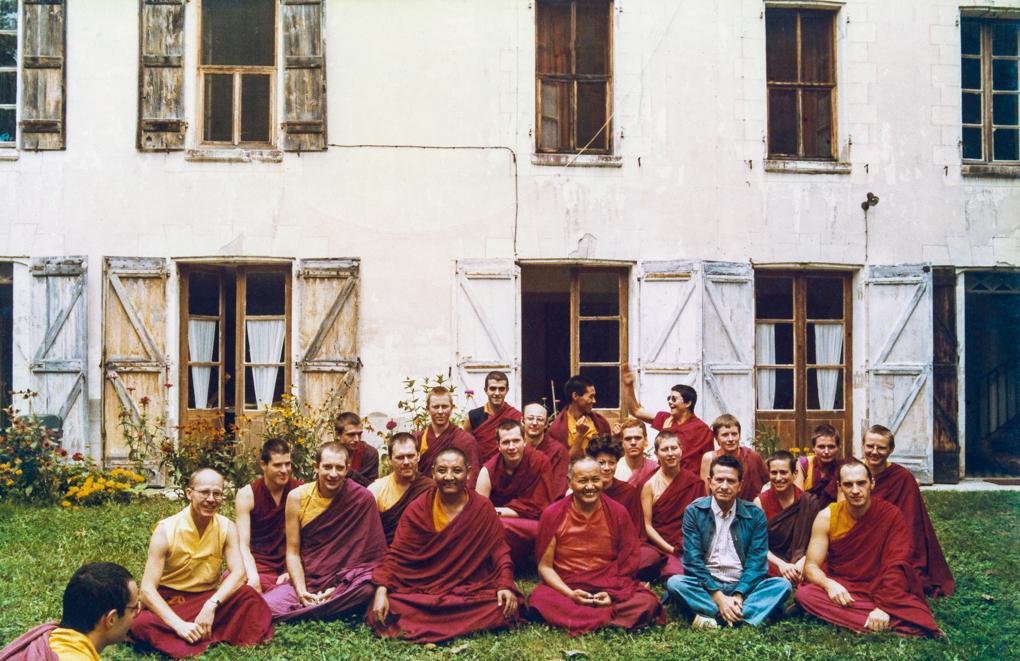
International Mahayana Institute Sangha, Nalanda Monastery, Lavaur, France, 1983. Photo includes Adrian Feldmann (Thubten Gyatso), Chodron Thubten (Cherry Greene), Dieter Kratzer, Lama Yeshe, Merry Colony, Sangye Khadro (Kathleen McDonald), Geshe Jampa Tegchok. Also included in the photo a local priest, Father Bastiani, wearing blue. Photo courtesy of Lama Yeshe Wisdom Archive.
Lama Thubten Yeshe (1935–1984) gave a talk to the fledgling Western Sangha at Tushita Retreat Centre in Dharamsala, India, in April 1982, during the first Enlightened Experience Celebration. Lama Yeshe addressed the purpose of Nalanda Monastery, the FPMT monastery in France, and the importance of Western Sangha becoming teachers.
Here’s a short excerpt of this talk taken from the Lama Yeshe Wisdom Archive’s most recent multimedia presentation: The Advantages of Monastic Life: Advice for Monks and Nuns. (Click through to see photos and video of Lama Yeshe teaching, and to read more.)
It is important that we consider how to present Dharma in the West. You can’t just say, ‘‘Oh, this director invited me to come and give teachings. OK, I’ll just go.’’ This has happened many times, but I’m not sure that it’s appropriate. Therefore, I wanted to say a little about education at Nalanda Monastery.
What is the purpose of Nalanda Monastery? It is a center for education, for Buddhist studies. Ideally, this means that eventually all the Sangha will become teachers. Come on! I want you to understand this. Now, being a teacher doesn’t mean only being an intellectual words teacher. There are many different ways in which you can teach. Generally, however, I expect everybody to be well educated. There is a great demand for teachers in our centers; we are very short of them. Are you aware of this or not? Everybody should know this. Then you will put more energy into trying to benefit others instead of being lazy. The world’s need for Dharma teachers is great.
The way this should work is that centers that need teachers should send their requests to the monastery, and the abbot and gekyö should decide who goes out to teach. That’s a good idea; it prevents people from doing their own individual trips. Of course, the center director can specify the qualifications or even the person required—‘‘He or she is best for us because of the way we communicate’’—something like that. For people to do their own trip is not so good. Also, this is not some kind of competition; we are just trying to be as beneficial as possible.
I feel sometimes that Western teachers are more suitable for Western beginners. They are oriented to the culture and may be more acceptable to new students: ‘‘This is just what I need; I can use this.’’ We should encourage Westerners to do this kind of thing. Of course, Tibetan lamas can still come to give advanced teachings, but there are limitations to this as well. Therefore, we should hurry to educate ourselves well so that we can be of maximum benefit to others.
In our Sangha community, many students are already experienced in giving lamrim courses. They have been teaching and I’m very happy about that. They are growing. Some Sangha members have intuitively understood that they should teach; I didn’t have to push them. But others don’t understand that they should teach and worry about it: ‘‘Lama said everybody has to teach. How can I possibly become a teacher?’’ Don’t worry. Whatever your ability, just do as much as you can with your life. To my way of thinking, that’s good enough. You don’t necessarily have to push yourself to accumulate intellectual knowledge. We have room for people to serve the Buddhadharma in many different ways.
In the future, if we organize the monastery situation well, benefiting others through your education will also provide your bread and butter. Do not feel that, just because you cannot take care of yourself at the moment, your life as a Tibetan Buddhist monk or nun will always be economically difficult. That kind of mind arises sometimes; it’s not so good. It’s quite right to think about the situation, but many people in the world need teachers and, if you are well educated, they will support you. If a center applies for a Sangha member to come and teach, the center should take care of that person’s airfare, food, clothing, and stipend. Sangha should have a big view. If you educate yourself well and serve others, they will take care of you; it’s natural. You offer something, you benefit others—others will benefit you. That’s the cyclic nature of samsara. …
The Advantages of Monastic Life: Advice for Monks and Nuns presents the teachings of Lama Yeshe in a multimedia format that beautifully weaves together video of Lama Yeshe, transcripts, and images. Edited by Nicholas Ribush and published by LYWA in Advice for Monks and Nuns. Multimedia presentation created by Megan Evart. May the Sangha flourish in the ten directions for the benefit of all sentient beings!
The Lama Yeshe Wisdom Archive offers more than twenty multimedia presentations for students at any level to explore and deepen their understanding of the teachings of Buddha as shared by Lama Yeshe and Lama Zopa Rinpoche.
Through timely advice, news stories, and updates, FPMT.org and Mandala Publications share the wisdom culture inspired and guided by the teachings of FPMT founders Lama Thubten Yeshe and Lama Thubten Zopa Rinpoche.
25
Integrating What You’ve Heard
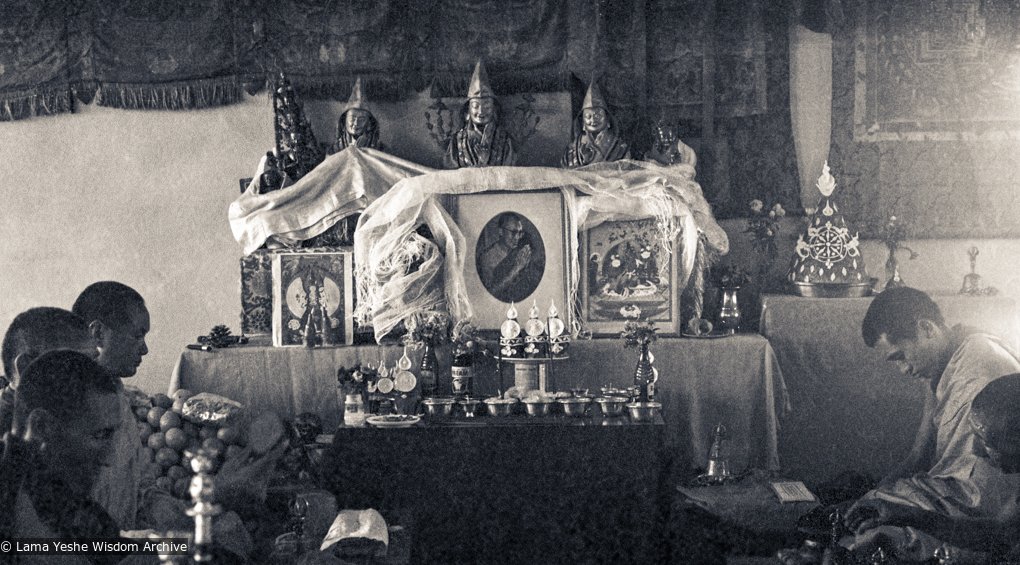
Installing the portrait of His Holiness the Dalai Lama in the Kopan Gompa. Lama Yeshe and Lama Zopa with other monks offering prayers, Kopan Monastery, Nepal, 1972. Photo courtesy of Lama Yeshe Wisdom Archive.
In the early 1970s, Lama Thubten Yeshe (1935–1984), who founded FPMT with Lama Zopa Rinpoche, gave Sunday afternoon lectures to foreigners at Kopan Monastery in Nepal. These mostly young people would come from where they were staying in the immediate vicinity (very few people were able to stay at Kopan at the time) or Kathmandu to hear Lama Yeshe teach.
The following teaching excerpt comes from one of these Sunday afternoon sessions with Lama Yeshe. This teaching, which took place on January 2, 1972, is an example of how early Western students experienced Lama Yeshe, who was thirty-six years old at the time, and of his remarkable ability to connect with them.
So I think you people have gained enough intellectual understanding but have not yet actualized the teachings to the point of gaining realizations. Therefore, at this stage you need to say, “I understand that I’ve been following my old habits for countless lives. I no longer want to go on like this; I want to stop following the interpretations of my wrong conceptions.” If you begin to experiment and act in accordance with your intellectual understanding then you’ll really affect your mind.
Otherwise, you might know all the words, but when real trouble comes you go berserk, the same as you always have. If you don’t change your mind, you will continue to react in the same old way, no matter who you are—a lama, a yogi, a meditator in a cave— arrogantly thinking, “I’m special.” If you get down and depressed when difficulties arise, that shows you have no understanding.
The ancient Mahayana practitioners of India and Tibet would first listen to teachings and study deeply. When they felt they had gained enough knowledge, they would go into solitude and, avoiding all contact with other people, look completely within and experiment with inner realizations. It’s now necessary for you people to do the same thing.
What’s the point of listening, listening, listening to teachings, collecting words, but then not integrating what you’ve heard with your mind or gaining realizations? You’re not here to learn language from me! Your English is much better than mine. You’re not here just to listen and collect words; don’t believe that it’s only through listening to words that you can gain realizations. That’s a wrong conception.
You have to integrate into experience whatever you understand. Once you have gained experience and realization of one topic you need to go on to the next, which takes you further down the path. Without moving forward step by step, it’s impossible to progress; you can’t simply collect high-sounding words while leaving your actions down here on the ground. Collecting words that talk of flying to the moon doesn’t mean you fly to the moon; with words alone you remain earthbound. It’s the same if you think arrogantly that you can get higher realizations simply by listening to Lama’s words. Without actualizing that which you understand and integrating it within you, you can’t.
We think we learn from people: “I spent a long time with him and learned a lot.” What did you learn? I don’t think you learn from somebody by spending time with that person. You learn from yourself, from what your own mind says—everything’s in there. For example, the thoughts of everybody in the universe are already within you, so you can learn from your own mind; others’ expressions are already within your mind; if you listen to yourself, to your mind, you’ll find others’ expressions are there. So you might say, “I’m learning from him,” but I don’t think you are. Listen to your own mind; check yourself—that’s the way to learn and solve your own inner problems. I don’t think it’s so beneficial to always be looking, listening, and searching outside. That’s just externalism.
Check up, for example, why you can’t stay alone for a week without seeing or talking to anybody. Why can’t you? What makes it difficult? The difficulty comes from your own mind.
You should realize that all such experiences—happiness, peace, good, bad—completely depend on the interpretation of the individual wrong conception mind. If you realize the teachings beyond words, you’ll really be able to solve your inner problems.
Edited by Nicholas Ribush. You can read a full version of this teaching as a PDF from Mandala July-December 2019.
You can also find this teaching and many others like it from Lama Yeshe in The Enlightened Experience: Collected Teachings, Volume 1, an ebook by the Lama Yeshe Wisdom Archive (https://www.lamayeshe.com/). The ebook is a compilation of teachings given by Lama Yeshe in the 1970s and 1980s, when he traveled the world extensively with Lama Zopa Rinpoche and taught at many courses, seminars, and public talks.
Through timely advice, news stories, and update, FPMT.org and Mandala Publications share the wisdom culture inspired and guided by the teachings of FPMT founders Lama Thubten Yeshe and Lama Thubten Zopa Rinpoche.
16
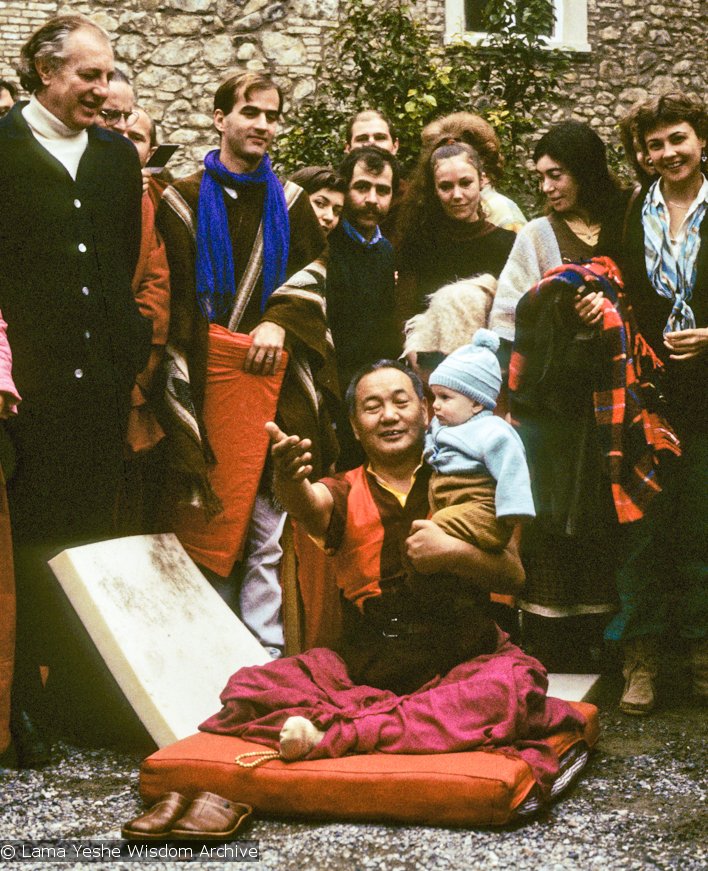
Lama Yeshe with children and families at Istituto Lama Tsongkhapa, Italy, 1983. Photos by Ueli Minder, courtesy of Lama Yeshe Wisdom Archive.
For FPMT students, Losar, the Days of Miracles, and Chotrul Duchen have an important significance as it commemorates the anniversary of the parinirvana of Lama Thubten Yeshe, who co-founded FPMT with Lama Zopa Rinpoche. As part of Lama Zopa Rinpoche’s advice on how to best use this sacred time of year, in addition to doing pujas and recitations, Rinpoche recommends taking time to share stories and remembrances of Lama Yeshe.
During the 100 Million Mani retreat at Istituto Lama Tzong Khapa in Italy in 2017, there were two sessions during which long-time FPMT students shared their stories of Lama Yeshe. These touching memories included stories from the early days at Kopan Monastery on the outskirts of Kathmandu, Nepal, and Lawudo Gompa, high up in the Himalayas, as well as from the time Lama Yeshe spent in Italy, France, and Spain. Lama Zopa Rinpoche and Tenzin Osel Hita, the reincarnation of Lama Yeshe, also make appearances in these stories.
We are happy to share two videos of these informal sessions. Please enjoy these touching accounts of Lama Yeshe’s kindness and wisdom as told by Massimo Corona, Ven. Elisabeth Drukier, Ven. Charles, Paula de Wys, Piero Cerri, and Ven. Zia Bassam.
Watch stories about Lama Yeshe from senior FPMT students (Massimo Corona, Ven. Elisabeth Drukier, and Ven. Charles):
https://youtu.be/al0YNTbWkUc
Watch stories about Lama Yeshe from senior FPMT students (Paula de Wys, Piero Cerri, and Ven. Zia Bassam):
https://youtu.be/PPddKA1zAFQ
These videos are also available in Spanish:
https://youtu.be/Q3xJ9DXjrlQ
https://youtu.be/YaV8WNsskb0
You can also watch them in Italian:
https://youtu.be/OYzrrfO4lPE
https://youtu.be/MXahdgQ8q6I
Read more about Losar, the Fifteen Days of Miracles, and what practices to do during this auspicious period.
For more stories about Lama Yeshe and hundreds of photos of Lama Yeshe with early students, see Big Love: The Life and Teachings of Lama Yeshe, published by the Lama Yeshe Wisdom Archive.
Through timely advice, news stories, and updates, FPMT.org and Mandala Publications share the wisdom culture inspired and guided by the teachings of FPMT founders Lama Thubten Yeshe and Lama Thubten Zopa Rinpoche.
- Tagged: fpmt history, lama yeshe, massimo corona, paula de wijs, piero cerri, tenzin osel hita, ven. charles, ven. elisabeth drukier, zia bassam
10
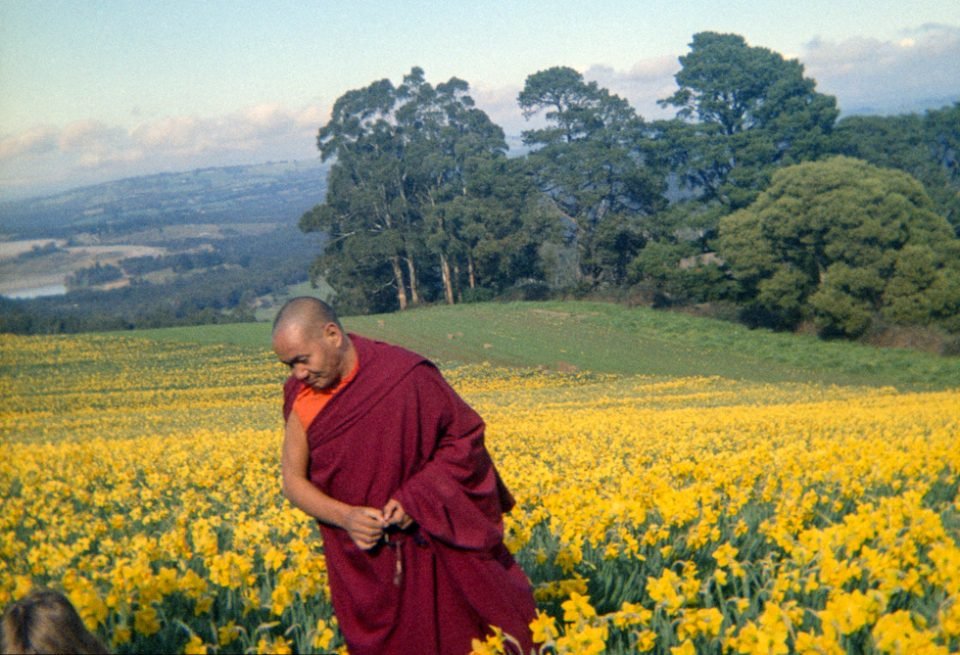
Lama Yeshe standing in a field of a daffodil farm while visiting the Dandenong Ranges near Melbourne, Australia, 1976. Photo courtesy of Lama Yeshe Wisdom Archive.
As Losar approaches on Friday, February 12, 2021, we want to remember Lama Thubten Yeshe, who founded FPMT with Lama Zopa Rinpoche. Lama Yeshe’s heart stopped beating just before dawn on Losar, March 3, 1984. Rinpoche recommends especially sharing remembrances of Lama Yeshe at this time of year. Lama Yeshe had a remarkable ability to connect with Western students, who flocked to his teachings wherever he traveled. What follows is an excerpt from a teaching Lama Yeshe gave in July 1976 to Australian students on how we exist in the world. Here Lama Yeshe talks about how to live with an understanding of karma:
In English, one word can have different meanings. Similarly, whenever you express your own religious conceptions, ideas, philosophies or doctrines—whatever word you choose for it—saying, “This is right, that is wrong,” you’re just expressing your personal experience, making a personal judgment, not something that’s true in terms of the understanding of all of humanity. Still, I think it’s difficult for you to understand even your own personal experience of the way you perceive things, the way you feel, the way you discriminate.
However, through meditation, you can learn to tell the difference between right and wrong mental attitudes and, in particular, you can see how your dissatisfied mind makes you miserable. By understanding that, you can liberate yourself from confusion—you don’t need to believe in something. That’s why in his teachings Lord Buddha said that understanding knowledge-wisdom is the path to liberation.
Most of the time, including the present, we’re unaware of what we’re experiencing. We eat, drink, and so forth unconsciously. It’s true—I’m not trying to hypnotize you. Most of the time we’re unconscious. But, through meditation you can recollect all your past experiences. You can take your mind back through last month, last year, and all the way back to the time you were reborn. Then, by knowing the cause and effect of your past lives’ experience, you can relate it to the present time and understand what’s going on now: “If right now I put my actions into this particular channel the effect should be such and such.” You can get a pretty good idea.
Therefore, it’s very important to know what’s going on in both your past and future experiences. “If I act this way, this is going to happen. If I act that way, that will be the effect.” Karma is very important.
Otherwise, many people think, “Whatever comes, comes. I’ll go along with that.” And then you do. Other people, especially in the East, have an extreme view of karma: “Karma is fixed; I can’t do anything. My karma has given me this kind of life; I have to accept it.” You can accept what you are in this present life, but it’s not fixed. You can change your present situation for a better future. It’s not fixed.
If you say, “My karma has led me to this miserable life, I can’t do anything about it, I believe in my karma,” that’s ridiculous. Instead of making progress and becoming more open, by accepting that wrong philosophy of karma you become more narrow-minded. That’s a dangerous thing. You talk about karma, but if you don’t know what karma really is and believe in your limited idea of it, you become a fanatic. Therefore, it’s very important to have the right understanding of karma.
Question: It seems, for instance, that whatever situation you’re born in, that’s your karma, and that’s something you can’t change.
Lama Yeshe: Yes, that’s right. You can’t change that, but you can change lifestyle. For example, I was born in Tibet but now I’ve changed in that I’ve adapted to the Australian lifestyle. I’m eating muesli, fantastic chocolates, and other things that we didn’t have in Tibet!
Look, say you accidentally cut your arm. OK, it’s already cut, but there’s no point worrying. That won’t help. What you should do is take measures to heal that cut. That’s all you can do. The cut is there; you have to accept it.
Similarly, say you see a snake. You think, “Oh, a snake’s life is awful. I wish that snake could become a happy person.” That’s impossible. You can wish that, but for the time being the snake’s karma is to be in such a body. Until that karma finishes neither you nor the snake can do anything about it. Its body can’t radically change into a human one just like that. It’s not possible.
However, don’t think that karma is fixed. You can change your karma; you can change a miserable situation into a happy, blissful one. Even if you’ve done the worst, most negative things in the world, you don’t need to worry. If, with right wisdom, you change your old behavior, you can become a perfectly enlightened being, even in this life. For sure, that’s possible.
You may read the complete teaching in the Lama Yeshe Wisdom Archive’s July 2020 E-letter. Lama Yeshe gave this teaching in Olinda, Victoria, Australia, 30 July 1976. Archive #776. Edited by Nicholas Ribush. See Big Love: The Life and Teachings of Lama Yeshe, Volume 1, Chapter 15, “Melbourne: The Olinda Course” for the context of this teaching.
Read more about Losar, the Fifteen Days of Miracles, and what practices to do during this auspicious period:
https://fpmt.org/edu-news/advice-and-ideas-for-losar-and-the-fifteen-miracle-days-of-chotrul-duchen-2021/
Through timely advice, news stories, and update, FPMT.org and Mandala Publications share the wisdom culture inspired and guided by the teachings of FPMT founders Lama Thubten Yeshe and Lama Thubten Zopa Rinpoche.
- Tagged: advice from lama yeshe, karma, lama yeshe, lama yeshes wisdom
15
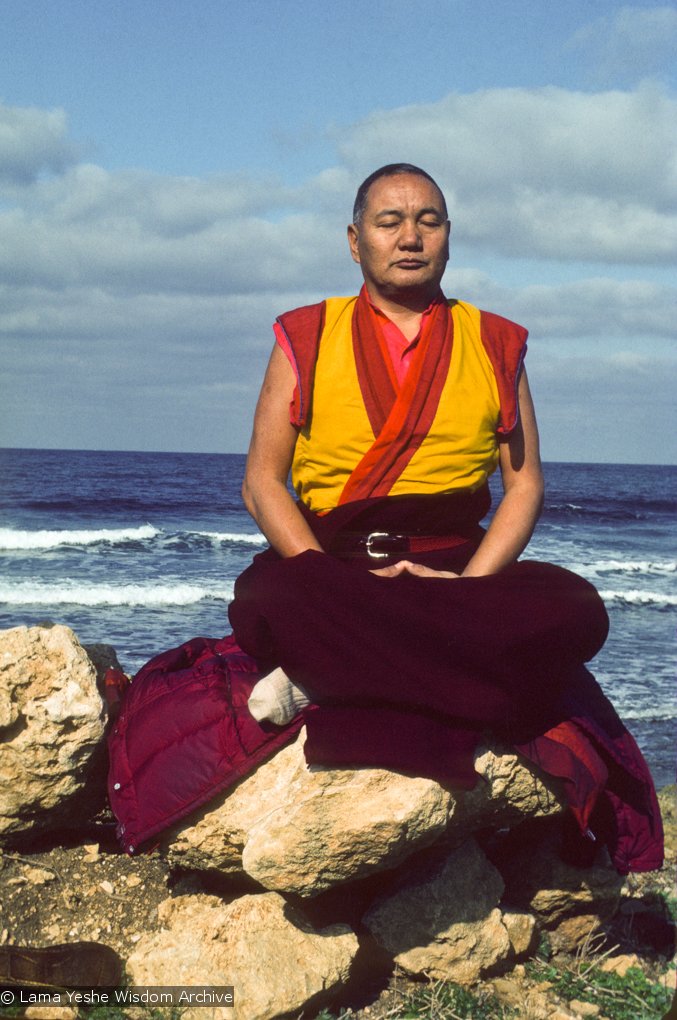
Lama Yeshe meditating by the sea, Sicily, Italy, 1983. Photos by Jacie Keeley, courtesy of Lama Yeshe Wisdom Archive.
Lama Thubten Yeshe (1935–1984) discussed how to deal with fear and anxiety in the context of the nuclear arms race and nuclear power at a talk given in 1983 in California, US. While today’s situation is different, Lama Yeshe’s insights are just as powerful now as they were when he first made them. Here’s a short excerpt of this talk found in the Lama Yeshe Wisdom Archive multimedia presentation “Switch Your Mind from Emotion to Peace”:
My concern is that if we allow ourselves to be anxious and afraid, emotionally disturbed, we’ll only produce more confusion within ourselves. When we’re confused, we spread confused energy to others and the environment. Bringing peace to the world is no small task. We have to take upon ourselves universal responsibility. As individuals, our first responsibility is to guarantee that we ourselves will never harm anybody else’s life, to generate the indestructible resolve that irrespective of the circumstances, “I’m never going touch weapons or kill other human beings.” We must have that kind of determination. If you don’t feel that way yourself, how can you make a big show if telling others to be like that. It’s not realistic. In order to educate others about how harmful and cruel nuclear energy can be, we first have to educate ourselves.
So, we shouldn’t worry about the nuclear age because it’s already here. We’re human beings; we created this situation. We lit this fire a long time ago. Of course, the earth has contained nuclear energy since it began, but has taken human intelligence to make it as dangerous as it has become. In Buddhism, we call this karma. Once a situation has manifested, the best thing to do is to accept the fact and deal with it.
Now, there’s no reason for us to hate each other, but anxiety breeds hatred. Therefore, we have to check our motivation for demonstrating for disarmament and against nuclear energy. Why are we doing this? Perhaps our reasons are selfish—what we’re really anxious about is our own destruction. Instead, we should have concern for the whole of humanity. That’s the right motivation. Then there’s no emotion. Even though you’re concerned, occasionally fearful, your fear does not come from an underlying, ever-present, emotional disturbance.
What’s the good of worrying about things twenty-four hours a day, disturbing your mind and preventing yourself from having a peaceful and joyful life? It’s a waste of time. Nothing’s going to change just because you’re worrying about it. If something’s already broken, it’s broken. Worrying won’t fix it. This earth has always been destructive by nature, nuclear age or not. There’s always blood flowing someplace or another. Look at world history. It’s always been like this. Buddhism calls this interdependent origination, and that’s how the human mind works.
Take America’s war in Vietnam, for example. That brought people together in a movement for peace. That’s also interdependent. Some people saw the horrible suffering, confusion, misery and destruction wrought by others, so they went the other way, thinking, “That’s not right,” and despite the difficulties, created a movement of peace and love.
But the right way to eliminate harm from this earth is to first free your mind from the emotional disturbances that cause irrational fear of destruction, and then educate yourself and others in how to bring peace to the world. The first thing you must do is to control your own mind and commit yourself: “From now on, no matter what happens, I’m never going to use weapons to kill any human being.” That’s where world peace starts.
Human beings can control their minds and actions such that they will never kill others; people can learn to see that harming others destroys not only the others’ pleasure and happiness but their own as well. Through this kind of education, we can prevent nuclear energy from destroying the world.
“Switch Your Mind from Emotion to Peace” presents the teachings of Lama Yeshe in a multimedia format that beautifully weaves together video of Lama Yeshe, transcripts, and images. The Lama Yeshe Wisdom Archive offers more than twenty multimedia presentations for students at any level to explore and deepen their understanding of the teachings of Buddha as shared by Lama Yeshe and Lama Zopa Rinpoche.
Through timely advice, news stories, and updates, FPMT.org and Mandala Publications share the wisdom culture inspired and guided by the teachings of FPMT founders Lama Thubten Yeshe and Lama Thubten Zopa Rinpoche.
- Tagged: advice from lama yeshe, lama yeshe, lama yeshe advice, lama yeshe wisdom archive, lama yeshes wisdom, world peace
5
True Dharma Practitioners Welcome Trouble
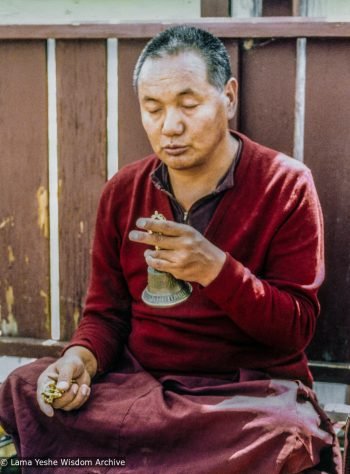
Lama Yeshe doing puja at Pyramid Lake after the Grizzly Lodge Course, California, US, 1980. Photo courtesy Lama Yeshe Wisdom Archive; Carol Fields, donor.
The following teaching from Lama Thubten Yeshe, who founded FPMT with Lama Zopa Rinpoche, encourages us to use our Dharma practice in difficult times.
Sometimes when people first hear Dharma teachings on happiness and suffering they think that happiness depends upon suffering and that if they were to be completely free of suffering there would be no way to experience happiness.
I can see where the idea comes from. In a way it’s quite logical: if there’s no misery, there’s no happiness; misery and happiness are interdependent phenomena. This is human experience. It’s my experience too.
When I was studying at Sera in Tibet from the ages of nine to twenty-four, I took many teachings and received many commentaries from excellent teachers. I was well looked after by my uncle, who made sure I never went hungry or thirsty and took care of me in general. It was a typical monastic life and it was really good. And from my side I tried my best to study and practice Dharma.
But still, in 1959, the Chinese kicked us out. Well, not exactly, but they did not allow people to practice Dharma, so I thought that if I want to keep practicing there was no reason to stay in Tibet. So I escaped to India. Not only were the Chinese preventing us from practicing, they were shooting people dead, and even though I had been studying and practicing, I didn’t feel ready to die.
So in that painful situation of uncertainty I had to look deeply into myself to see if all those teachings I had taken would allow me to cope with my new reality. I found that they helped a great deal, and that gave me the confidence I needed to deal with the changing environment in which we found ourselves.
If you’re not tested, you take teaching after teaching and think you’re OK, but when you’re confronted with a difficult situation, it’s possible that you’ll find you’re not OK at all. So that’s why true Dharma practitioners welcome trouble. It gives them a chance to see if what they’ve been studying works or not, a chance to transform suffering into happiness. Otherwise you just go blithely along, completely out of touch with reality, thinking you’re OK when you’re not, because you haven’t actually been practicing Dharma at all.
To put this another way, painful situations are a source of wisdom. How so? First of all, painful situations arise as a result of nonvirtuous karma. When we experience pain we should ask, “Why is this happening to me? How has this come about?” That sort of inquiry leads us to understand that it’s the ripening of negative karma we created in the past. That basic understanding can grow into wisdom; the painful experience helps us develop a deeper understanding that is beyond the merely intellectual.
Of course, if you’re completely ignorant, it doesn’t matter how much suffering you experience, there’s no way for that to lead to happiness. All you do is go from misery to more misery. If, on the other hand, you have at least a modicum of Dharma wisdom, when you’re in difficulty you know how to use that experience to lead yourself into happiness.
One lama said, “When things go well, you’re a great Dharma practitioner; when things go badly, your Dharma disappears. When your stomach is full and sunshine is pouring into your room, it’s easy to look religious; but when difficulties arise, you come up empty.”
It’s like when I was a young boy in Tibet and everything was going well, I pretty much took it for granted that I was practicing Dharma. It could easily have happened that when it came to the crunch, I could have found my Dharma practice wanting—that I’d never practiced or even understood Dharma—and that could easily have led me to give it up, thinking that Dharma doesn’t work.
Dharma practice is very difficult if you don’t understand what it is. You need to realize that Dharma teachings are talking about you, your personal reality. You need to take them personally and integrate them with your life. It’s no good if your Dharma understanding is like soup—many different ideas all mixed up—and you never make Dharma a part of your life. Then it can’t really help you.
If you understand your own attitude and level and know what you need at any particular moment in time, you can fulfill your needs appropriately and will see yourself making real progress. Simply collecting information that’s disconnected from your own reality doesn’t make sense. By understanding Dharma from your own point of view, from the way you live your life, you have a much better chance of developing yourself. So that’s what you should try to do. Base your practice on your own experience.
Lama Yeshe gave this teaching, “True Dharma Practitioners Welcome Trouble,” at Grizzly Lodge, California, in 1980. Edited by Nicholas Ribush. Published in Mandala October–December 2012. Also published in the Lama Yeshe Wisdom Archive ebook The Enlightened Experience, Volume 1.
Through timely advice, news stories, and update, FPMT.org and Mandala Publications share the wisdom culture inspired and guided by the teachings of FPMT founders Lama Thubten Yeshe and Lama Thubten Zopa Rinpoche.
24
See Everything as a Golden Flower
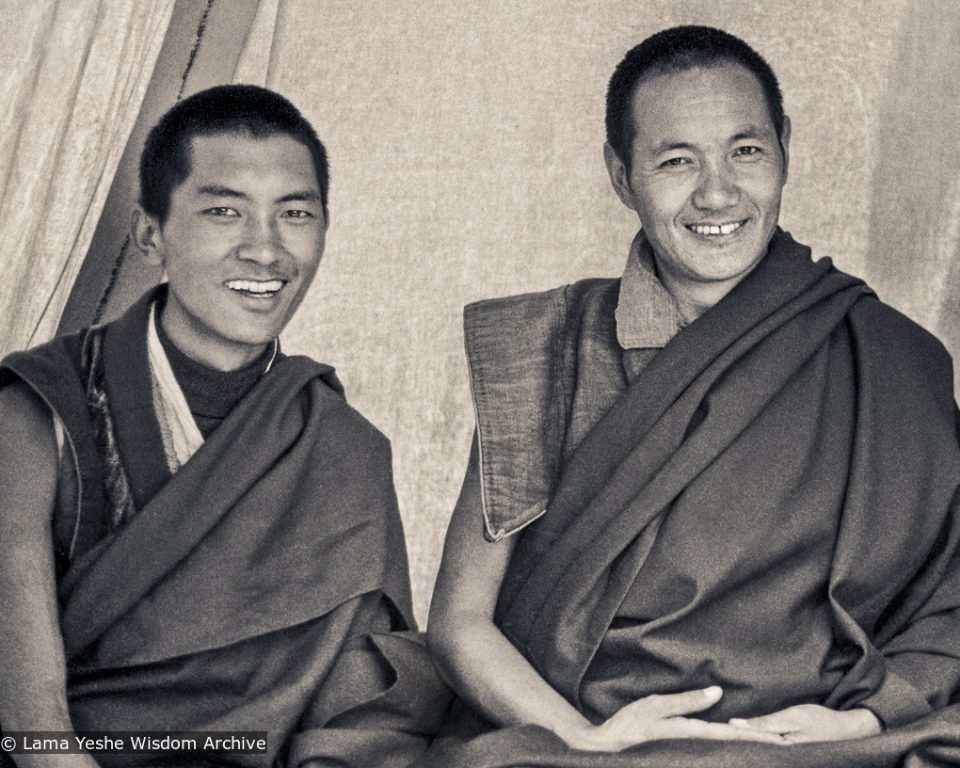
Lama Zopa Rinpoche and Lama Yeshe in a tent at Syangboche, Solu Khumbu, Nepal, 1972. Photo courtesy of Lama Yeshe Wisdom Archive.
With the celebration of the seasonal holidays interrupted because of the global pandemic, we have an opportunity to reflect on our usual attitudes and habits at this time of year, and perhaps change them. Lama Yeshe spoke about how to see Christmas in a talk he gave to students staying at Kopan Monastery in Nepal in December 1972. Here’s the story and Lama Yeshe’s advice in an excerpt from Big Love: The Life and Teachings of Lama Yeshe:
Lama Yeshe had great appreciation for the spirit of Christmas but not for the rampant consumerism and materialistic expectations that often came with it. Some of his students were also experiencing the difficulties of separating from the Christian tradition they grew up with as they established a connection with the Buddhist tradition they had just met. This confusion seemed to result in some feelings of aversion toward their Christian heritage and Christmas seemed an ideal time to talk with them about these mistaken attitudes.
From Lama Yeshe’s Christmas talks:
When we see each other again on Christmas Eve for the celebration of holy Jesus’s birth, let us do so in peace, with a good vibration and a happy mind. I think it would be wonderful! To attend the celebration with an angry disposition would be so sad. Come instead with a beautiful motivation and much love. Have no discrimination, but see everything as a golden flower, even your worst enemy. Then Christmas, which so often produces an agitated mind, will become so beautiful.
When you change your mental attitude, the external vision also changes. This is a true turning of the mind. There is no doubt about this. I am not special, but I have had experience doing this, and it works. You people are so intelligent so you can understand how the mind has this ability to change itself and its environment. There is no reason why this change cannot be for the better.
Some of you might think, “Oh, I want to have nothing to do with Jesus, nothing to do with the Bible.” This is a very angry, emotional attitude to have toward Christianity. If you really understood, you would recognize that what Jesus said was, “Love!” It is as simple and as profound as that. When you have true love within you, I am sure that you will feel much more peaceful than you do now.
How do you normally think of love? Be honest. It is always involved with discrimination, isn’t it? Just look around this room and see if anyone here is an object of your love. Why do you discriminate so sharply between friend and enemy? Why do you see such a big difference between yourself and others? In the Buddhist teachings, this falsely discriminating attitude is called dualism. Jesus said that such an attitude is the opposite of true love. Therefore, is there any one of us who has the pure love Jesus was talking about? If we do not, we should not criticize his teachings or feel that they are irrelevant to us. We are the ones who have misunderstood, perhaps knowing the words of his teachings but never acting upon them.
There are many beautiful sentences in the Bible, but I do not recall reading that Jesus ever said that without your doing anything whatsoever, without preparing yourself in the same way, the Holy Spirit will descend upon you—whoosh! If you do not act the way he said you should act, there is no Holy Spirit existent anywhere for you.
What I have read in the Bible has the same connotation as the Buddhist teachings on equilibrium, compassion, and changing one’s ego-attachment into love for others. It may not be immediately obvious how to train your mind to develop these attitudes, but it is certainly possible to do so. Only our selfishness and closed-mindedness prevent us.
With true realizations, the mind is no longer egotistically concerned with only its own salvation. With true love, one no longer behaves dualistically, feeling very attached to some people, distant from others and totally indifferent to the rest. It is so simple. In the ordinary personality, the mind is always divided against itself, always fighting and disturbing its own peace.
The teachings on love are very practical. Do not put religion somewhere up in the sky and feel you are stuck down here on earth. If one’s actions of body, speech, and mind are in accordance with loving kindness, then you automatically become a truly religious person. To be religious does not mean that you attend certain teachings. If you listen to teachings and misinterpret them, you are, in fact, the opposite of religious. And it is only because you do not understand a certain teaching that you abuse religion.
Lack of deep understanding leads to partisanship. The ego feels, “I am a Buddhist, therefore Christianity must be all wrong.” This is very harmful to true religious feeling. You do not destroy a religion with bombs but with hatred. More importantly, you destroy the peacefulness of your own mind. It does not matter whether you express your hatred with words or not. Words do not mean anything. The mere thought of hatred automatically destroys your peace. Similarly, true love does not depend on physical expression. You should realize this. True love is a feeling deep within you. It is not just a matter of wearing a smile on your face and looking happy. Rather, it arises from a heartfelt understanding of every other being’s suffering and radiates out to all of them indiscriminately. It does not favor a chosen few to the exclusion of everyone else. This is true love.
For the Mount Everest Centre boys [the young monks from Solu Khumbu staying at Kopan], this was their first Christmas. Mummy Max shopped for them at the Commissary, returning with a Christmas tree, American-style trimmings, and plenty of chocolate goodies. They had lots of fun helping her decorate the tree, which was placed in the new gompa.
Visit the Lama Yeshe Wisdom Archive (LamaYeshe.com) for more on Big Love: The Life and Teachings of Lama Yeshe by Adele Hulse.
Through timely advice, news stories, and update, FPMT.org and Mandala Publications share the wisdom culture inspired and guided by the teachings of FPMT founders Lama Thubten Yeshe and Lama Thubten Zopa Rinpoche.
- Home
- News/Media
- Study & Practice
- About FPMT Education Services
- Latest News
- Programs
- New to Buddhism?
- Buddhist Mind Science: Activating Your Potential
- Heart Advice for Death and Dying
- Discovering Buddhism
- Living in the Path
- Exploring Buddhism
- FPMT Basic Program
- FPMT Masters Program
- FPMT In-Depth Meditation Training
- Maitripa College
- Lotsawa Rinchen Zangpo Translator Program
- Universal Education for Compassion & Wisdom
- Online Learning Center
- Prayers & Practice Materials
- Overview of Prayers & Practices
- Full Catalogue of Prayers & Practice Materials
- Explore Popular Topics
- Benefiting Animals
- Chenrezig Resources
- Death & Dying Resources
- Lama Chopa (Guru Puja)
- Lama Zopa Rinpoche: Compendium of Precious Instructions
- Lama Zopa Rinpoche: Life Practice Advice
- Lama Zopa Rinpoche Practice Series
- Lamrim Resources
- Mantras
- Prayer Book Updates
- Purification Practices
- Sutras
- Thought Transformation (Lojong)
- Audio Materials
- Dharma Dates – Tibetan Calendar
- Translation Services
- Publishing Services
- Teachings and Advice
- Find Teachings and Advice
- Lama Zopa Rinpoche Advice Page
- Lama Zopa Rinpoche: Compendium of Precious Instructions
- Lama Zopa Rinpoche Video Teachings
- ༧སྐྱབས་རྗེ་བཟོད་པ་རིན་པོ་ཆེ་མཆོག་ནས་སྩལ་བའི་བཀའ་སློབ་བརྙན་འཕྲིན།
- Podcasts
- Lama Yeshe Wisdom Archive
- Buddhism FAQ
- Dharma for Young People
- Resources on Holy Objects
- Ways to Offer Support
- Centers
- Affiliates Area
- Teachers
- Projects
- Charitable Projects
- Make a Donation
- Applying for Grants
- News about Projects
- Other Projects within FPMT
- Support International Office
- Projects Photo Galleries
- Give Where Most Needed
- FPMT
- Shop
Translate*
*powered by Google TranslateTranslation of pages on fpmt.org is performed by Google Translate, a third party service which FPMT has no control over. The service provides automated computer translations that are only an approximation of the websites' original content. The translations should not be considered exact and only used as a rough guide.The workshop is in the mind.







